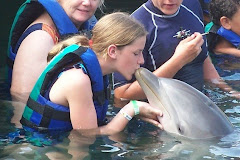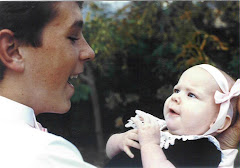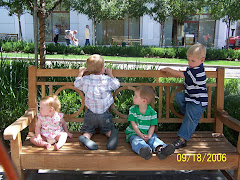Sunday
Large Families
This article opened a floodgate of conversation around our home because our children swear that they learned how to survive because they were raised in a large family. Where else can you learn the skill of sitting down to dinner, sizing up what is placed before you and in seconds find the largest portions of food on the serving plates. They knew right where to strike as soon as the blessing was said. Maybe survival has a different meaning to my children but they have learned to never be the last one at the dinner table. The responses I heard from them about her article was my reward. I would like to share with you what my children had to say about large families.
“We have driven through California and we saw a lot of open space our there for more people.”
“I think it is fun to have a lot of family around. She must have had a bad experience as a child with her family. Maybe she was an only child and doesn’t realize how great the support is of siblings and parents who are there for you.”
“Her point of view must be coming from somewhere we have never been. She views all people as takers, not givers to society. Aren’t we supposed to help those who can’t give then teach them how to give?”
“We turn to each other when we need help. She must not understand support in a family and that we are here for each other.”
“I don’t see our large family as a burden to society. We have all been raised to give back more than we are given. I wonder how she raised her own children? Did she make them feel like they were in her way?”
These comments made about this woman and her editorial’s point of view are, of course, only my children’s assumptions as to her background and upbringing but it demonstrated to me that having a large family has been and is a pleasant experience for my children. It is not the number of children in a family that is important, but rather how they are raised that determines whether they are a liability or as asset to society. We, as LDS families, have a ready-made culture that teaches us the “hard work” ethic and the importance of being service oriented. When a child is raised with this foundation they become givers to society, not takers. It is true that the average LDS family size is larger than the norm but I have never been informed that the number of children in a family unit has any influence on the quality of individuals that we send out into the world, whether or not that child comes from a small or large family. From my point of view it is the gospel principles that teach more than the size of family.
This is just another reason why we need to set the best example we can to the world. Because human nature leads us to want to be like the successful person or family in this case, we, as LDS, can set a standard and share the foundation of the gospel with others. The way to “Resolve the world’s ‘too many children’ dilemma,” is to share the truths of the gospel with everyone.
Friday
Let Them Go
I thought about this day several years ago as I held my last newborn in my arms but I didn’t realize it would be in here in the blink of an eye. I’ve sent my two youngest away this past month, one on a mission to Japan which is a whole different emotion and the other off to BYU – Provo. As hard as it is on me to stop mothering I know their desire to leave home is a natural process. If they don’t, they will end up pushing away and resenting the fact that they are still at home. So the old oxymoron phrase takes on a more significant meaning, “To keep them, you have to let them go.” It really is too bad because after their high school and teenage years you start to like them again and enjoy their company.
As the bitter sweet drive to Utah began it was fun hearing the conversation between my son and daughter. They have always been best friends and the last minute advice, older sibling to younger sibling, was taking place. Sitting in the front seat I marveled at the mature advice being given on how to succeed in college from someone who just a year ago was heading in the same direction with no experience at all. This made me realize that the best learning experience one can receive is just that…experiencing it yourself. I don’t know how much of the advice given she will retain but I hope that she will be able to recall his advice as the first year away from home progresses and as situations arise.
First he gave the practical advice…1) Always study in the library, not in your apartment. Keep your apartment as a fun place to relax, to maintain a balance. 2) Books first, socializing second. 3) Don’t procrastinate assignments, keep up on your reading and know your assignment deadlines. 4) Budget your time and think of school as a job. When you are there, be there mentally; schedule in both study and free time. 5) Don’t be intimidated by others’ accomplishments; you are at that university because of who you are. There are always going to be those who have accomplished more. Remember that those you are comparing yourself to may have had only 60 in their graduating class compared to your 750. 6) Seek others who bring out the best in you and those you would like to emulate. 7) Take a fun class each semester. 8) Keep you standards high and obey the rules of the university. 9) Develop self, talents and personality. 10) Have fun!
I had to turn around to see if that was really my child in the back seat who had only been away from home one year! It was! Maybe I should have sent him away earlier. His counsel verified that life is often the best teacher because if he had stayed home with me he never would have learned that wisdom. I would still be mothering him today.
Then he gave additional insight that I found even more profound. 1) People love to feel important. No one likes to be alone so make everyone around you feel that they are special. 2) Think positive thoughts. What you say to yourself determines your outcome. 3) Don’t just pray for good test results…you need to study hard for them too. 4) Respect what others respect. It tells them that you care about what is important to them. 5) Never openly criticize. Use the phrase, “Have you thought about it this way?” 6) Learn to be happy alone; do things on your own. Everyone has their own schedule. You can’t have friends do everything with you because they are going their own way also. 7) If you do not like someone it’s because you have made up a reason not to like them. So make up a reason to like them.
I couldn’t help but think to myself, “If that much insight was gained in only one year away from home just think what two years on a mission will bring with the Lord being his tutor!” He did a much better job at advising his sister than I ever could have done. His counsel only reinforced what he learned in his own mind. I didn’t have to say another word as he had said it all. Those principles he had just counseled his sister with he will also use on his mission. My only advice to them was a quote I heard several years ago and can’t remember the source so who ever said it, thank you. It goes like this, “Work without vision is drudgery; vision without work is dreaming; work plus vision is success.” That quote sums it all up, even for us mothers who are left behind beginning a new life while we let our children go.
















